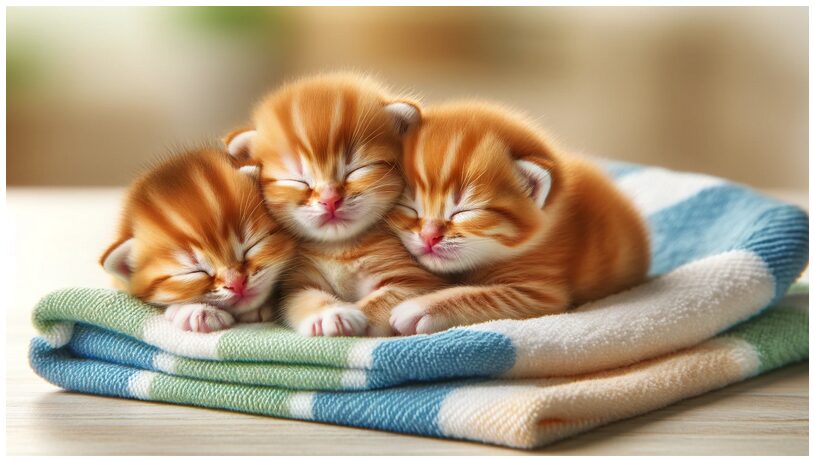Oh, the miracle of life! Whether you are reading this because your cat is expecting or because the cat distribution system has bestowed one or more newborn kittens upon you, there are a few things you need to understand about the needs of newborn kittens.
Newborn Kittens Need A Mom
First things first, kittens change a lot in those first few weeks. And what they need changes too. Kittens that are less than seven weeks old need a mother or very specialized care that not everyone is able or prepared to provide. Newborn kittens need to be fed every 2–4 hours on a very strict schedule for the first two weeks. If the flow rate on the bottle is too high, the kittens can aspirate the formula and catch pneumonia or even die. After two weeks, they can be transitioned to 4-5 small meals per day, but the amounts need to be carefully calculated by body weight to prevent diarrhea. The VCA Animal Hospital has a detailed guide Feeding Orphaned Kittens. And your local ASPCA can put you in touch with local kitten foster programs.
AlleyCatAllies.org has a Kitten Progression Guide with nice pictures and developmental details that can help you figure out how old the kitten is and, lacking a mom cat, if you have the time and resources you need to care for them adequately. The ASPCA offers a decision tree based help guide I Found Kittens What Do I Do that can be very helpful in deciding if you should intervene if you find kittens.
If you have both the mama cat and her kittens, you will still have some things to consider in order to provide them with the best possible support.
The Right Environment
Temperature
Warmth is key. And by warm, I mean really toasty warm. Their nest box should be at 90°F for the first four days, gradually decreasing to 80°F by the end of the first week. Kittens aren’t able to regulate their body temperature until they are approximately five weeks old and are completely dependent on their environment for warmth. The mom cat and other siblings can help to provide warmth. But if you prefer your thermostat at 70°F you are going to need to provide some supplemental heat for the box.
Safety
The nest box should be in a quiet, secluded place away from bright lights and noise. This is especially important if you have small children. Newborn kittens shouldn’t be handled any more than is necessary to confirm their health and growth. Bright lights, noise and excessive handling can stress the mother and her kittens and have a negative impact on the mother’s milk production and nursing time. It can also cause the mother to move the kittens, sometimes repeatedly and not always to the best of locations. Providing a safe, secure and calm environment for the mother cat and her kittens can do a lot to maximize the potential for strong and healthy kittens.
Monitor Their Health
Daily weights can be a simple way to verify that everything is on track. Failure to gain weight is a serious sign in kittens and a vet should be consulted immediately. On average, you would expect newborn kittens to gain 7-14 grams a day. But weighing kittens this young and looking for these tiny weight shifts can be tricky. So please watch this informative video by The Kitten Lady, a professional kitten rescuer, for everything you need to know about weighing your newborn kittens.
Newborn Kittens Need A Loving And Well Informed Caregiver
Here are some additional resources that can help!
Raising Kittens
By Courtney Barnes, BSc, DVM; Krista Williams, BSc, DVM; Ernest Ward, DVM
What Should People Do When They Find Kittens
FAQ: Cornell University College of Veterinary Medicine







This piece exemplifies good content through its structured approach and comprehensive exploration of key themes. It is a valuable resource for anyone seeking to deepen their knowledge.
Wow, what an engaging read.
It sparked so many ideas. Thank you!
What an interesting article, I loved it. Thanks
This content is exceptionally well-crafted, demonstrating a thorough understanding of the subject matter. The insights provided are both informative and engaging.
I really appreciate how it breaks down complex ideas into easily digestible parts. Can’t wait to read more.
The quality of this content is commendable.
Subscribing for future updates.
I appreciate the effort put into creating this content. It reflects a high standard of professionalism.
High-quality content. Thanks!
Can’t wait to read more from this site
Wow, what an engaging read